Over 3 days, from September 10 to 12, 2024, the State Audit Office of Vietnam hosted the 8th Working Group on Big Data of the International Organization of Supreme Audit Institutions (INTOSAI WGBD) in Ninh Binh. The conference, themed “Data Governance – A New Effective Tool in Auditing: A Data Quality Perspective,” attracted over 100 domestic and international delegates, including representatives from 23 Supreme Audit Institutions (SAIs) and Vietnam’s National Assembly, the State Audit Office, and the provincial leadership of Ninh Binh and neighboring provinces, as well as embassies.
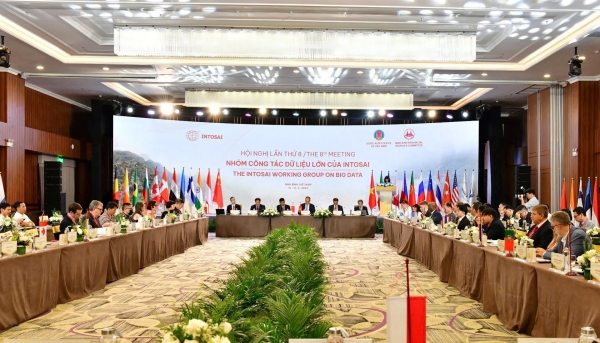
8th Working Group Meeting on Big Data of the International Organization of Supreme Audit Institutions (INTOSAI WGBD)
Knowledge and Experience Sharing on Big Data Auditing
According to Mr. Ngo Van Tuan, State Auditor General of Vietnam, INTOSAI WGBD has made significant progress over the years, especially in knowledge-sharing activities on high-quality auditing using advanced technologies. This has been beneficial to the INTOSAI community as a whole and its members individually.
Vietnam’s State Audit Office joined as an observer in 2020 and became a full member in October 2023, actively contributing to the Working Group’s activities. For this conference, they collaborated with the National Audit Office of China to choose the theme “Data Governance – A New Effective Tool in Auditing: A Data Quality Perspective.” This theme allowed member and observer SAIs to explore, share knowledge, and exchange experiences on the challenges, opportunities, successes, and valuable lessons in data governance and big data auditing.
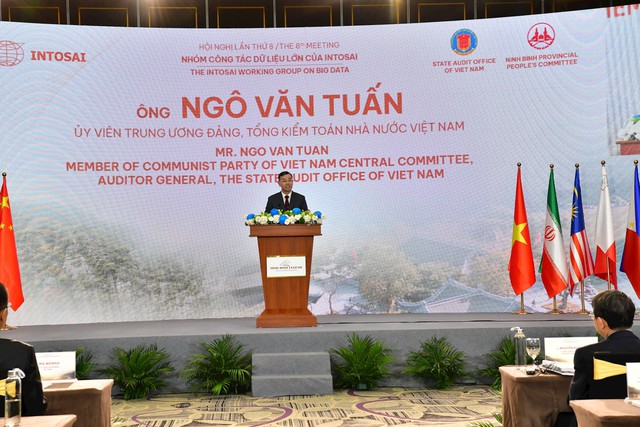
State Auditor General Ngo Van Tuan delivers the opening remarks
Mr. Nguyen Duc Hai, Vice Chairman of the National Assembly, emphasized that one of the important goals of the State Audit Development Strategy by 2030, issued by the National Assembly’s Standing Committee, is to “improve the State Audit’s electronic working environment by building a data infrastructure and a centralized big data management system. This system will connect with related databases to collect and utilize analysis and forecasting tools to meet the requirements of management and development of auditing activities in a digital environment. Additionally, it will promote the application of digital technology, notably big data, artificial intelligence, natural language processing tools, and the Internet of Things in auditing and internal management.”
Effective data governance and successful digital transformation of the State Audit Office of Vietnam are closely related to the “Project to Build an Electronic National Assembly towards a Digital National Assembly” currently being developed and implemented by the National Assembly of Vietnam.
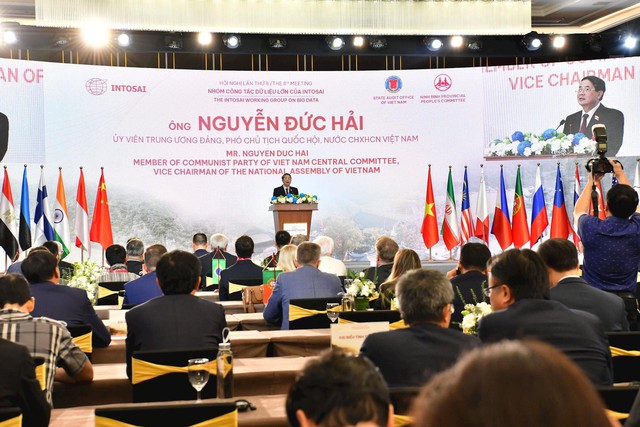
Mr. Nguyen Duc Hai, Vice Chairman of the National Assembly, speaks at the conference
Auditing practices have shown that data is both a management asset and a tool for SAIs to build dynamic accountability policies. However, the potential of big data also comes with challenges in effective data utilization. Therefore, the conference provided a platform for delegates to discuss best practices and collaboratively tackle common challenges, demonstrating a shared commitment to shaping the public audit of the digital age.
Six Tasks to Activate Data
Mr. Ma Wenhui, Deputy Auditor General of the National Audit Office of China, stated that new technologies, including big data, the Internet of Things, and AI, are flourishing, and all countries are utilizing big data daily to modernize their social and national governance systems. Public auditing is an essential component of national governance.
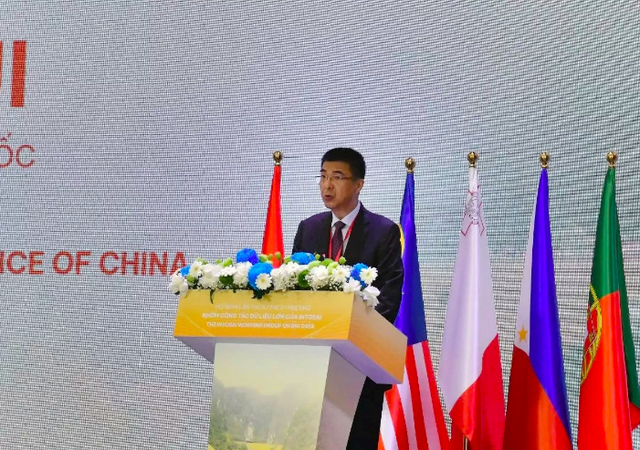
Mr. Ma Wenhui, Deputy Auditor General of the National Audit Office of China, speaks at the conference
Global SAIs recognize the importance of big data in enhancing audit quality. Over the past eight years, data sources from INTOSAI members have rapidly expanded, and technologies have been upgraded to facilitate broader utilization of big data. However, SAIs face challenges due to data standardization issues and the potential for better technology utilization.
According to the International Data Management Association, data governance involves managing data resources through licensing and data analysis to ensure efficient data management. It is a complex, systemic task involving multiple stakeholders to address all links in the value chain.
Mr. Ma Wenhui emphasized that data governance is a complex, systemic task involving multiple stakeholders, addressing all links in the value chain. To enhance data governance, we must focus on developing and improving auditing capabilities and fostering collaborative efforts from all parties to promote six tasks to activate data.
Specifically: Establish a data system and clarify the responsibilities of data management and auditing agencies; improve data management, analysis, and standardization mechanisms; enhance systems for optimizing data storage and algorithms; improve data licensing systems to facilitate easier and more effective access for auditors; increase the efficiency of applying creative mechanisms to facilitate data integration and coordination between on-site and remote auditing; ensure compliance and data security by strengthening data security management systems.
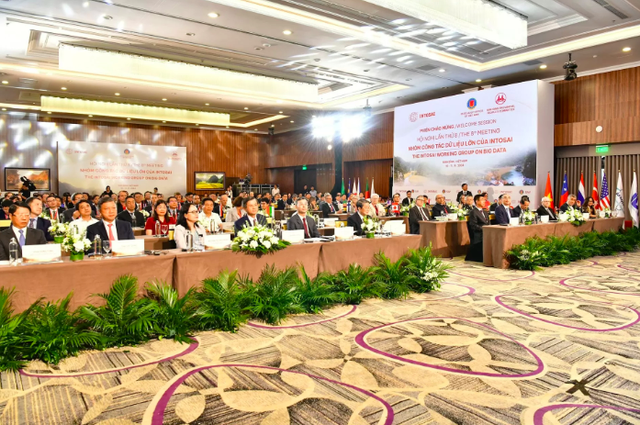
The conference attracted over 100 domestic and international delegates, including representatives from 23 Supreme Audit Institutions (SAIs)
At the conference, delegates from the National Audit Offices of China, Brazil, and India presented important reports: the Working Group’s progress report, the progress report on the research project “Application of Big Data in the Field of Health and Social Security,” and the progress report on the research project “Artificial Intelligence in the Audit Process.”
In addition to these three critical reports, 22 member and observer SAIs contributed papers related to the theme “Data Governance – A New Effective Tool in Auditing: A Data Quality Perspective.” These papers focused on sharing knowledge and experiences regarding challenges, opportunities, successes, and valuable lessons in data governance and big data auditing. The State Audit Office of Vietnam presented a paper outlining the current status of its data infrastructure development and data analysis application in auditing, along with achievements, difficulties, and proposed solutions.
This annual conference had the largest number of speakers among all INTOSAI WGBD meetings to date. This reflects the growing interest in the Working Group within the international auditing community due to its role in promoting the application of big data in auditing and the importance of big data in optimizing auditing processes and effectiveness.
From a local perspective, Mr. Doan Minh Huan, Secretary of the Ninh Binh Provincial Party Committee, expressed his confidence that the conference would contribute to the overall success of INTOSAI’s activities. He believed it would help members share experiences on advanced methods and tools in the field of big data, thereby enhancing the effectiveness of auditing, management, and budget and public asset administration.
No more delays, “Economic information assistant” Askonomy brings a completely new way to read news
We are developing a revolutionary new media product that is a game changer in the journalism industry. From reading print newspapers to online news platforms and accessing content on smartphones, with Askonomy, readers actively participate in conversations, exchange information, and get the exact information they need.
VNG Company: More than 163 million customer accounts exposed, says Ministry of Public Security
With the prevalence of personal data breaches in the online space, the Ministry of Public Security has provided concrete evidence of a specific incident where VNG Company exposed over 163 million customer accounts.


















